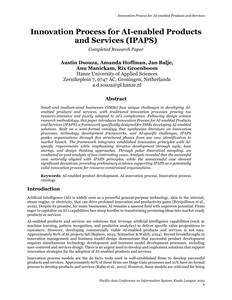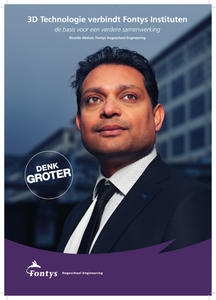The proceedings contain 24 papers. The special focus in this conference is on Challenging the Future with Lean. The topics include: A Confrontation Between Lean Thinking and Postmetaphysical Philosophy; barriers and Enablers of Lean Industry 4.0; how Organizations Can Harness Continuous Improvement Practices to Develop Their Data Analytic Capability: A Conceptual Paper; Introducing DACAR: A Process Mapping Tool to Uncover Robotization Implications in Manufacturing; toward 1+1 = 3 with Lean Robotics: The Introduction of a Human-Centered Robotization Method; digital Tools Supporting Lean Program in a Multinational Enterprise; lean Planning & Control in a High-Variety/Low-Volume Environment; sustainability Struggles: Investigating the Interactions of Lean Practices and Barriers to Environmental Performance in Manufacturing; Investigating the Relationship Among Lean Manufacturing Practices to Improved Eco-Efficiency Performance: A Fuzzy DEMATEL Analysis; The Contribution of SMED to the Sustainability of Organizations; hoshin Kanri for Social Enterprises - Co-visualizing Values-Based Strategic Plans; integration of a Robot Solution in a Manufacturing Environment: A Serious Gaming Approach; using Games and Simulations to Facilitate Generative Conflict; the Influence of Learning Styles on the Perception of Lean Implementation Effectiveness by Employees; current State of Practice in Developing Lean Six Sigma Training and Certification Programs -an Irish Perspective; improving the Success Rate of Lean-Themed Internships; serious Games as a Lean Construction Teaching Method - A Conceptual Framework; The Impact of SMED on Productivity and Safety; a Systematic Literature Review on the Use of Lean Methodologies in Enterprise Sales Processes; the First Chapter of a Regional Deployment of a Continuous Improvement Program in a Medical Device Company.
LINK
This paper presents work aimed at improved organization and performance of production in housing renovation projects. The purpose is to explore and demonstrate the potential of lean work organization and industrialized product technology to improve workflow and productive time. The research included selected case studies that have been found to implement lean work organization and industrialized product technology in an experimental setting. Adjustments to the work organization and construction technology have been implemented on site. The effects of the adjustments have been measured and were reviewed with operatives and managers. The data have been collected and analyzed, in comparison to traditional settings. Two projects were studied. The first case implied am application of lean work organization in which labor was reorganized redistributing and balancing operations among operatives of different trades. In the second case industrialized solution for prefabricated installation of prefabricated roofs. In both cases the labor productivity increased substantially compared to traditional situations. Although the limited number of cases, both situations appeared to be representative for other housing projects. This has led to conclusions extrapolated from both cases applicable to other projects, and contribution to the knowledge to improve production in construction. Vrijhoef, R. (2016). “Effects of Lean Work Organization and Industrialization on Workflow and Productive Time in Housing Renovation Projects.” In: Proc. 24 th Ann. Conf. of the Int’l. Group for Lean Construction, Boston, MA, USA, sect.2 pp. 63–72. Available at: .
MULTIFILE

A school and especially a university must operate efficiently, while also offering innovation space. In meeting these requirements, it can neither leave 100% on lean, nor inspiration (think of the art schools half a century ago). Companies need continuity. Serendipity may facilitate this. However, sometimes they have to be able to exploit new opportunities at lightning speed. In those cases, continuity can be fatal, because it removes agility.
MULTIFILE

Biomimicry education is grounded in a set of natural design principles common to every known lifeform on Earth. These Life’s Principles (LPs) (cc Biomimicry 3.8), provide guidelines for emulating sustainable strategies that are field-tested over nearly four billion years of evolution. This study evaluates an exercise for teaching LPs to interdisciplinary students at three universities, Arizona State University (ASU) in Phoenix, Arizona (USA), College of Charleston (CofC) in Charleston, South Carolina (USA) and The Hague University of Applied Sciences (THUAS) in The Hague (The Netherlands) during the spring 2021 semester. Students researched examples of both biological organisms and human designs exhibiting the LPs. We gauged the effectiveness of the exercise through a common rubric and a survey to discover ways to improve instruction and student understanding. Increased student success was found to be directly linked to introducing the LPs with illustrative examples, assigning an active search for examples as part of the exercise, and utilizing direct assessment feedback loops. Requiring students to highlight the specific terms of the LP sub-principles in each example is a suggested improvement to the instructions and rubric. An iterative, face-to-face, discussion-based teaching and learning approach helps overcome minor misunderstandings. Reiterating the LPs throughout the semester with opportunities for application will highlight the potential for incorporating LPs into students’ future sustainable design process. Stevens LL, Fehler M, Bidwell D, Singhal A, Baumeister D. Building from the Bottom Up: A Closer Look into the Teaching and Learning of Life’s Principles in Biomimicry Design Thinking Courses. Biomimetics. 2022; 7(1):25. https://doi.org/10.3390/biomimetics7010025
DOCUMENT

Educational policies in the Netherlands reveal that the current mainstream participatory approach to citizenship education jeopardises students’ autonomy. Especially in Dutch post-secondary vocational education, citizenship education has been shown to be mainly aimed at socialization: initiating students into tradition, internalising rules, societal norms and values. This article reports on the findings of a research project, which is grounded in the assumption that integrating Bildung, citizenship education and critical thinking is a promising way to grapple with the perceived overemphasis on socialization strategies. We justify the interrelationship of critical thinking, Bildung, citizenship education, and professional training from two perspectives – historical and contemporary. It is only by combining these concepts, we contend, that educational professionals can create teaching materials more geared to developing autonomy, and prepare students in vocational training to navigate the political and societal dilemma’s on the work floor. Furthermore, we also clarify our perspective by offering three educational principles, used in our project to guide the design of teaching materials, that form a context for integrating citizenship, critical thinking, and Bildung in vocational education. A practical illustration is subsequently discussed.
DOCUMENT

Active participation of stakeholders in health research practice is important to generate societal impact of outcomes, as innovations will more likely be implemented and disseminated in clinical practice. To foster a co-creative process, numerous frameworks and tools are available. As they originate from different professions, it is not evident that health researchers are aware of these tools, or able to select and use them in a meaningful way. This article describes the bottom-up development process of a compass and presents the final outcome. This Co-creation Impact Compass combines a well-known business model with tools from design thinking that promote active participation by all relevant stakeholders. It aims to support healthcare researchers to select helpful and valid co-creation tools for the right purpose and at the right moment. Using the Co-creation Impact Compass might increase the researchers’ understanding of the value of co-creation, and it provides help to engage stakeholders in all phases of a research project.
DOCUMENT

Small and medium-sized businesses (SMBs) face unique challenges in developing AI-enabled products and services, with traditional innovation processes proving too resource-intensive and poorly adapted to AI's complexities. Following design science research methodology, this paper introduces Innovation Process for AI-enabled Products and Services (IPAPS), a framework specifically designed for SMBs developing AI-enabled solutions. Built on a semi-formal ontology that synthesizes literature on innovation processes, technology development frameworks, and AI-specific challenges, IPAPS guides organizations through five structured phases from use case identification to market launch. The framework integrates established innovation principles with AI-specific requirements while emphasizing iterative development through agile, lean startup, and design thinking approaches. Through polar theoretical sampling, we conducted ex-post analysis of two contrasting cases. Analysis revealed that the successful case naturally aligned with IPAPS principles, while the unsuccessful case showed significant deviations, providing preliminary evidence supporting IPAPS as a potentially valid innovation process for resource-constrained organizations.
MULTIFILE

In: ‘Onderzoekend op weg’, een essaybundel over opdrachten voor de toekomst, geschreven door de lectoren van De Haagse Hogeschool t.g.v. het afscheid van Rob Brons als collegevoorzitter, januari 2014 In dit essay worden nieuwe ontwikkelingen in de sector van de gebouwde omgeving beschreven. Door de crisis zagen bedrijven zich genoodzaakt te innoveren teneinde te overleven. In deze bijdrage worden de strategieën die zij daartoe gevolgd hebben, in vogelvlucht beschreven. Vervolgens wordt gekeken naar de consequenties van de veranderingen in de sector voor het onderwijs en het onderzoek aan de hogeschool. Deze bijdrage is gebaseerd op onderzoek zoals beschreven in het boek Samen Sneller Slimmer en maakt ter illustratie gebruik van aldaar weergegeven interviews.
DOCUMENT

In my view, organisations are playing an ever-larger role with and in these changes. This is why we need organisations that are not afraid to express and give concrete meaning to their innovative views on economic and social themes. These are organisations that dare to break out of the old thought and behavioural patterns in order to create room for change and renewal. They are guided by an innovative philosophy and mode of thinking, and show this leadership by translating this body of thought into concrete actions and results. This is why, in the professorship, we call these organisations ‘thought leaders in a society of change’.
DOCUMENT

De wereld verandert in een razend tempo. Technologische ontwikkelingen hebben een grote impact op mens en maatschappij. Het verandert niet alleen onze manier van werken maar ook onze manier van leven. Steeds meer disciplines hanteren technologie als basis om in een professionele omgeving het werk kwalitatief beter, sneller en effi ciënter uit te voeren. Digitalisering, globalisering en informatisering maakt het mogelijk om plaats- en tijdonafhankelijk te studeren en te werken. Fontys Hogescholen speelt hier op in door tal van initiatieven te ondersteunen die gericht zijn op het volgen van deze en opkomende trends rondom technologische ontwikkelingen en de impact voor het onderwijs. Met het Fontys Objexlab zetten we deze beweging door. Opkomende technologieën zoals 3D printing en Robotica maken we graag toegankelijk voor collega’s. Andere instituten kunnen hiervan gebruik maken zodat zij hun onderwijs nog aantrekkelijker en actueler kunnen maken. In het najaar van 2014 zijn we gestart met het samenbrengen van collega’s van verschillende instituten en opleidingen om enerzijds deze nieuwe technologieen te leren en te ervaren, om daarna een stap te maken in het initiëren van ideeën en plannen om met deze kennis en vaardigheden onderwijsvernieuwing gezamenlijk vorm- en inhoud te geven.
MULTIFILE
